- Home
- Tim Powers
Three Days to Never Page 10
Three Days to Never Read online
Page 10
“Were you going to blackmail Einstein?” asked Marrity. “About his daughter?”
“Can I smoke?” his father asked, reaching behind him to fumble in the pocket of his jacket.
“Sure. Daph, would you get an ashtray?” Daphne nodded and pushed her chair back.
“You don’t know me at all,” the old man went on, “so I can’t take any offense at that remark. But no, I didn’t try to blackmail him. My mother may have.”
“To get what?” asked Marrity.
Daphne laid a glass ashtray on the table at the man’s elbow, but he didn’t look at her as he tugged out of his pocket an opened pack of Marlboros and shook one out. “The same thing she extorted from me, maybe. Absence. He never came back to California after ’33.” He looked at Daphne at last. “I bet your movie wasn’t wrecked. Did you pull it out?”
“It sure smoked,” she said cautiously. “And it’s been outside all night. Snails probably ate it.”
The old man tore off two matches and lost hold of both of them, then with evident care tore off another and managed to strike it alight and hold it to the end of his cigarette. “I’ve got,” he said as he puffed on the cigarette and blew out the match, “a friend who restores all kinds of electromagnetic hardware—computer disks, cassette tapes. You give it to me and I’ll show it to him.”
“No,” said Marrity. “I’m going to—fix it myself.”
“Right,” said Daphne.
His father stared at Marrity. “You know about that stuff, do you?”
“For all you know, that’s what I do for a living,” Marrity said.
The old man frowned in evident puzzlement. “I suppose that’s true. I’ve got some errands to run, but I’d like to take the two of you to lunch.” He dropped the burnt match into the ashtray. “On me!” he added.
“We’ve got a lunch date already,” Marrity said.
His father nodded, as if he’d expected the answer. “Uh—tomorrow?”
“I’ll be working,” said Marrity. Reluctantly he added, “Maybe dinner tomorrow?”
“Dinner’s good. Seven?”
”’Kay. Have you got a phone number?”
“Not, not right at the moment. You’re listed—I’ll call you at six, to make sure we’re still on. Let’s make it Italian—so don’t have Italian today, okay?”
“Okay.”
“Promise?” The old man seemed anxious.
“Yes, I promise.” Marrity stood up. “Well, it’s been—distressing.” He didn’t hold out his hand.
“Bound to be, just at first,” the old man said, pushing back his chair. “Probably we’ll get more friendly. I truly hope so. Daphne, a—pleasure to meet you. I wish you well.”
“Thanks,” said Daphne, staring down at the table.
“No Italian today, remember,” said Marrity’s father as he got laboriously to his feet. “Tomorrow night we’ll do it all—lasagna, pizza—antipasto—”
As Marrity and his father walked out the kitchen door, Marrity stood between the old man and the wrecked VCR, and when his father had hobbled away down the driveway, he bent down to pick it up.
“Daph,” he called into the kitchen, “would you get the gas can for the lawn mower? I’m going to just plain incinerate this thing.”
And, he thought, I believe I’ll keep those letters of Grammar’s with me, in my briefcase.
The old guy’s walking out,” said Golze as he drove by the Marrity house for the fourth time, in a white Toyota now; “limping, to be more precise. The guy who was fixing his car on the other side of the street is gone.”
“Our man didn’t answer his phone,” said Rascasse’s voice from the radio clipped to the dashboard. “He let the machine take it. Charlotte, did you get anything? You never give me your money,” he added.
Golze reached out and clicked the radio’s channel selector to the next frequency in their agreed-on sequence—they were using titles from the Beatles’ Abbey Road album as cues.
“That house is set awful far back from the road,” Charlotte said. “I was able to see through a child, a bit—must have been the little girl. Two men at a kitchen table, one clearly her father: thirty-five, dark haired, six foot, thin; the other was this old guy who just got into the—oh! darling.” After Golze had switched channels again, she went on, “just got into the green Rambler. They’re clearly related, the two men, strong resemblance. Old guy was smoking a cigarette, and drinking whiskey or brandy, brown stuff. That’s all.”
Golze made a slow right turn, eyeing his mirrors. The yards around here all seemed to be scattered with wrecked trucks or live goats.
“No help with the floor plan?” asked Rascasse’s voice from the radio.
“Not much. The kitchen is about ten by twenty, narrow ends at north and south; doorway at the north end of the east wall, a step up to a landing, I don’t know what’s past it.”
“Okay. You didn’t see—mean Mr. Mustard.” Again Golze reached out and clicked the channel selector. “—see a videocassette, or some round, flat film cans—”
“No, but aside from the kitchen, all I saw was the bottom half of the driveway.” So, thought Charlotte, the dead old woman’s magical device was a movie?
She suppressed a nervous smile—she’d been imagining something more like a candelabra made from a mummified hand, at least.
“Charlotte,” said the voice from the speaker, “I may want you to approach the girl’s father, Maxwell’s silver hammer.” Click. “—assuming we get a chance to get into his house and work up a profile. Preliminary, just establish a relationship, no questions yet. Come together.” Click. “Very accidental meeting, you know, the sort of thing that even in retrospect he won’t think could have been planned. Be charming. Right?”
“Right,” she said.
Since first hearing of him last night, the Vespers had found out that Francis Thomas Marrity was a widower with one twelve-year-old daughter, Daphne; his wife, Lucy, had died in ’85 of pancreatic cancer, when the child was ten. Marrity was a college literature professor, with a thirty-thousand-dollar mortgage, life insurance through the Automobile Club, and no criminal record at all.
She wasn’t going to mention it to Rascasse or Golze, but while she’d briefly been looking through the little girl’s eyes, she had momentarily got a flicker image of the little girl herself, though there hadn’t been a mirror nearby—it was as if the girl had for an instant been sharing the perspective of one of the men on the other side of the table. She was a pretty little thing, apparently, with big eyes and brown bangs.
Charlotte had decided way back in her missile-silo days that there was no gain in mentioning details that might complicate settled arrangements. Do what’s best for little Charlotte, she thought.
Through Golze’s eyes now Charlotte saw a woman pause from hanging T-shirts and jeans in a fenced-in yard to glance at the white Toyota, and for a moment Charlotte shifted her viewpoint to the woman; and she eyed her own silhouette critically as the car drove past. Still cheerleader pretty, as always, she thought. And ideally I won’t need it much longer.
Opus is always looking for his mother,” said Daphne, sitting at the kitchen table. She was belatedly reading the comics, and clearly had got to the Bloom County strip. “I suppose she’s a penguin too.”
“I suppose,” agreed Marrity, standing at the sink.
Daphne pushed the newspaper away. “It must be weird,” she said, “to suddenly have a real father, sitting in your kitchen smoking a cigarette.”
“It is,” said Marrity. He was washing his hands with dishwashing detergent. “He’s got a good explanation, hasn’t he?” He dried his hands on a paper towel and smelled them—the gasoline reek was hardly detectable. My life stinks of gasoline lately, he thought.
“Did he mean he’s gay?” asked Daphne.
“Um, yes.”
“He’s not gay,” she said.
Marrity walked back to the table and sat down. “How do you know?” he asked her.
&nbs
p; “Paul and Webster, at your college, they’re gay. And some of Uncle Bennett’s friends. They’re—it’s not like they’re always joking, or always sad, but—they’re not like your father.”
“Well, that’s a small sample, and this father guy wasn’t anything like relaxed.”
She shrugged, clearly not conceding the point. “We can’t go to Alfredo’s?”
“Sure we can.”
“You promised not to.”
“Actually I’d—” Marrity paused, then laughed uncertainly. “I think I’d like a chance to break a promise to him. He deserves a lot of broken promises.” He shrugged. “We can tell him we had Mexican.”
“Okay. And can we fix up my room this morning? Can I paint the walls?”
“Sure, if you don’t mind that Swiss Coffee color we used in the hall. In fact, I should paint over the smoke marks on the hall ceiling.” Marrity picked up the glass his father had used and swirled the diminished ice cubes in it. “What do you think of him? Short acquaintance, I admit.”
“He wants something. From us.”
“That video?”
“I think so! But even with it gone, something.” She pushed her cold bowl of oatmeal away. “What do you think of him?”
“I’m embarrassed by him. I feel sorry for him. I think he’s an alcoholic. And just telling me why he abandoned Moira and me and our mother doesn’t change the math.” He shook his head. “I don’t think he’ll…ever be more than a stranger to me.”
Tears stood in Daphne’s eyes. “This is worse than before, isn’t it?”
Marrity took a breath to answer, paused, and then let it out. “I guess it is,” he said finally. “No more hundreds of possibilities, just this one old drunk cranking around in Grammar’s car.”
Seven
As Marrity held open the tinted glass door of Alfredo’s for her, Daphne asked him, “What are you going to have besides beer?”
The air was cooler inside the dark restaurant, and smelled of fennel and garlic.
“Two for lunch, please, smoking or nonsmoking doesn’t matter,” Marrity said to the hostess behind the cash-register counter. They had missed the lunch crowd because of having painted Daphne’s room and the hall ceiling, and he could see several empty booths with fresh silverware and red-and-white paper place mats on the tables.
“It’s a hot day,” he told Daphne as they followed a waitress to a booth against the west wall. “I’m thinking about a beer because that’s what I want first. I don’t know why sausage and bell peppers looks so good to you on a day like this.”
“I haven’t absolutely made up my mind.”
“It’s all I see in there,” he said as he sat down across from her. “The young lady will have a—” Marrity said to the waitress, “—don’t tell me—a lemon in it, that’s an iced tea. And could I have a Coors, please.”
“You were picturing two,” Daphne said after the waitress had walked away.
“And I’m going to have two,” Marrity told her, “but not both at once.”
“You should get the chicken and broccoli. You don’t eat enough vegetables.”
“Onions and potatoes are vegetables.”
“They’re not green. You don’t eat right. Your guts are probably all creepy looking.”
“You’ve got paint in your hair.”
She looked dismayed, and glanced back toward the cashier’s counter as she patted her bangs. “A lot?”
“No. Here.” He reached across the table, pinched a strand of her brown hair and drew the fleck of paint down to the ends, where it slid off. “Only somebody sitting right across from you under this light could have seen it.”
“Thank God for that.”
Charlotte Sinclair strolled from the back of the parking lot toward the entrance to Alfredo’s, trailing the fingers of her right hand along the brick wall for balance. She had changed into black jeans and a burgundy short-sleeved blouse, and her dark brown hair was now pulled back in a ponytail, though her sunglasses were the same. She carried a purse in her left hand, letting the strap swing free.
She lingered at one section of the wall for a full thirty seconds, then moved on, rounding the building’s northwest corner and shuffling carefully right past the entry door. By the coolness of the air, she knew she was in shadow now. At the northeast corner she turned right again and made her way along the restaurant’s eastern wall, again trailing her fingers along the brick surface.
She turned around and walked back to the curb, and when she heard a car squeak to a stop in front of her, she looked out of the driver’s eyes and saw herself standing in the sunlight beyond the open passenger-side window; with that view to guide her, she was able to put her hand on the door handle and lean down to speak to the driver.
“Mirror,” she said.
“I always forget.” The man bent sideways to look at himself in the rearview mirror, and Charlotte recognized the lean, white-mustached face of Roger Canino, the Vespers security chief at the Amboy compound. Charlotte opened the door and got into the passenger seat.
“How’s my favorite girl?”
“Fine, Roger.”
As the car began moving, she groped in her purse—no sense in asking old Canino to look in there for her—and by touch found the radio and switched it on. In a moment she heard Rascasse’s voice say, “Prime here.” He pronounced it preem.
Leaning down over the purse and pressing the send button, she said, “Seconde here. The old guy from the green Rambler, octopus’s garden”—she switched the frequency up one notch—“is sitting way in the back on the east side, by the restrooms; it’s the smoking section, there are ashtrays on the tables. He’s got a couple of empty beer bottles and the remains of spaghetti in a white sauce in front of him, but he’s done eating and it looks cold to me, polythene Pam.” Again she clicked the dial. “Our man and his daughter are in a booth against the west wall, toward the front, north, on the other side of the kitchen. They’re just ordering now.”
“Got it, thanks,” came Rascasse’s voice.
“Can I be one of the parties?” she said. “I’m hungry.” Actually she wanted to monitor Marrity and his daughter from a closer vantage point, without the restaurant wall between her and them; for a moment there, as she had been looking at Daphne through Marrity’s eyes, she had found herself seeing Marrity’s face, and she remembered the same skipping-across phenomenon happening this morning when she had been monitoring Daphne from the car.
I’ve never slipped from one viewpoint to another accidentally before today, she thought. Am I losing my grip? Will I start seeing everybody’s viewpoint at once?
“No, Charlotte,” came the voice from the speaker, “because.”
The radio was silent. “That was a cue, sweetie,” said Canino without looking away from the traffic.
“What,” said Charlotte, “‘Because’? Shit.” She switched the frequency dial again.
“—bumper-beeper on his Ford—” Rascasse was saying.
“Again, from the bridge,” said Charlotte.
“Oh,” came Rascasse’s voice. “Okay, You can’t go in because you’re going to cute-meet him later, remember? If we don’t find the artifact in his house or truck. We’re doing research in the house right now, to prep you for it. And we’ve got a bumper-beeper on his Ford pickup—if we need you, we should be able to make an opportunity before sundown.”
“Right.”
“Any clues about who the old fellow is? She came in through the bathroom window.”
“That one I get,” Charlotte muttered, switching the frequency again. “No,” she said. “Strong family resemblance with our man, as you’ve seen. His father, maybe.”
“Probably in town for the funeral,” said Rascasse. “Obviously he is supposed to meet them in the restaurant.”
Charlotte didn’t correct him, but it seemed to her that neither Marrity nor the old man expected the other to be there.
Who are these guys?” whispered Bert Malk to himself as he drove past
Alfredo’s in the opposite direction. He had just seen the dark-haired girl in the sunglasses climb into a car that then sped away with her; she had probably been a lookout—probably another one had stepped up. And she was pretty definitely the same girl he had seen this morning cruising twice past Marrity’s house.
Bozzaris would probably already be in the restaurant. Malk had stopped at a 7-Eleven parking lot pay phone to call the relay sayan, and had got a message from Lepidopt: Crew of three entered M’s house as soon as father and daughter drove away. You two prevent any kidnap. Daylight.
“Daylight” meant “highest state of alert.”
This was a full-scale operation by somebody.
Malk was aware of the angular shape of the Beretta Model 70S against his hip. It held nine .22 long-rifle rounds—a small caliber, but it was the Mossad standard, and the theory was that it didn’t need a silencer since the report of a .22 round, though loud, didn’t exactly sound like a gunshot. It was more a loud snap than the deafening pop of bigger calibers. And the long-rifle .22s were plenty deadly if they were put in the right places.
He steered left onto E Street to check for alternate exits from the parking lot and any back doors of the restaurant.
When Malk had finally parked and walked into the restaurant, Bozzaris was already inside, waiting on a vinyl couch by the west-side nonsmoking dining room, and he stood up and jerked his head in that direction.
“Yo, Steve,” he said. “Table’s waiting.”
Any name that began with “S” meant I haven’t had time to do a route, to be sure I’m not being followed.
Swell, thought Malk as he followed the younger man to a table only a couple of yards away from a booth occupied by a preteen girl and a dark-haired man of about his own age, mid-thirties. That’s our quarry, he thought, not letting himself look directly at Frank and Daphne Marrity. He noticed that Frank had lasagna, and Daphne was eating some kind of pasta with sausage and bell peppers on it.
Malk and Bozzaris sat at adjoining sides of the square table, more or less between the Marritys and everyone else. Malk was mentally rehearsing the old training on how to throw himself backward in his chair and shoot under the table.

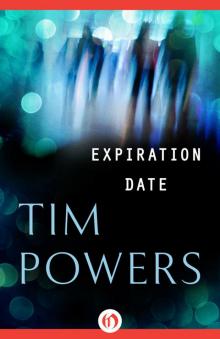 Expiration Date
Expiration Date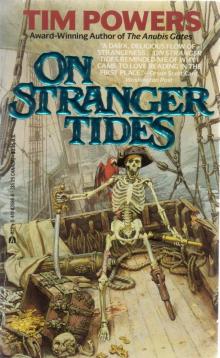 On Stranger Tides
On Stranger Tides Earthquake Weather
Earthquake Weather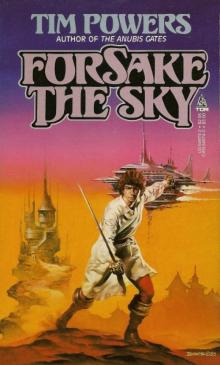 Forsake the Sky
Forsake the Sky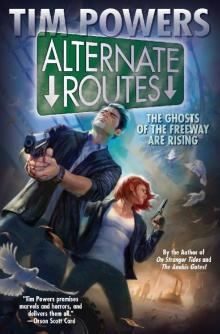 Alternate Routes
Alternate Routes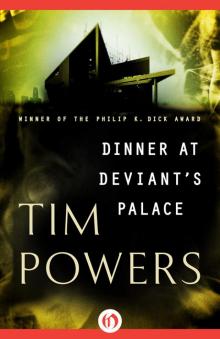 Dinner at Deviant's Palace
Dinner at Deviant's Palace The Stress of Her Regard
The Stress of Her Regard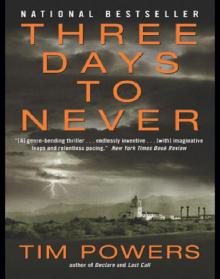 Three Days to Never: A Novel
Three Days to Never: A Novel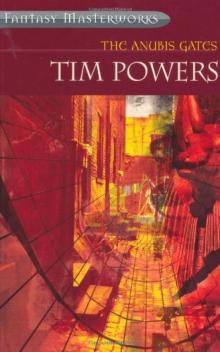 The Anubis Gates
The Anubis Gates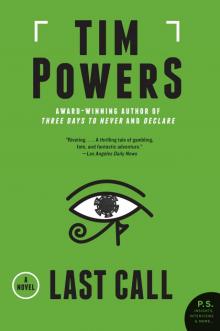 Last Call
Last Call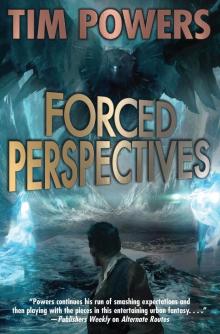 Forced Perspectives
Forced Perspectives Strange Itineraries
Strange Itineraries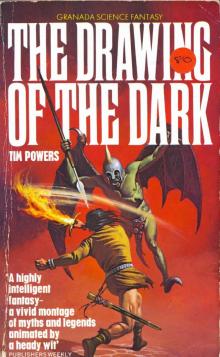 The Drawing of the Dark
The Drawing of the Dark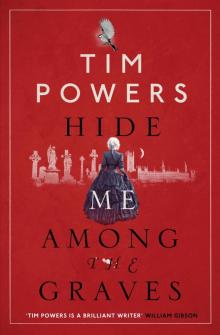 Hide Me Among the Graves
Hide Me Among the Graves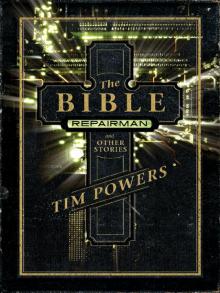 The Bible Repairman and Other Stories
The Bible Repairman and Other Stories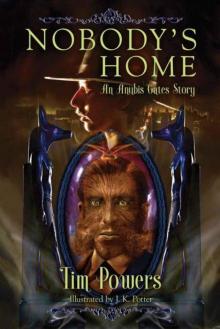 Nobody's Home: An Anubis Gates Story
Nobody's Home: An Anubis Gates Story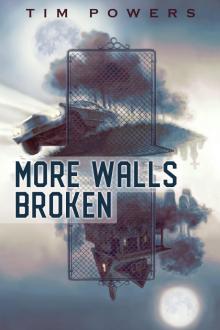 More Walls Broken
More Walls Broken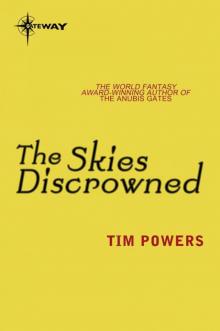 The Skies Discrowned
The Skies Discrowned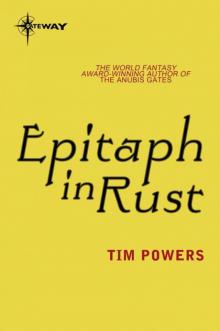 Epitaph in Rust
Epitaph in Rust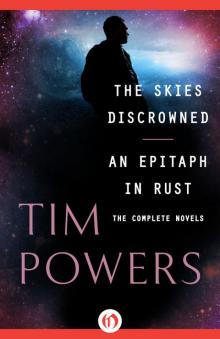 Skies Discrowned and An Epitaph in Rust
Skies Discrowned and An Epitaph in Rust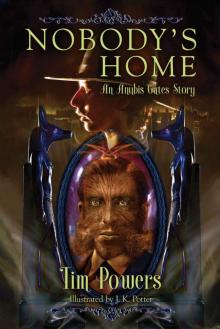 Nobody's Home
Nobody's Home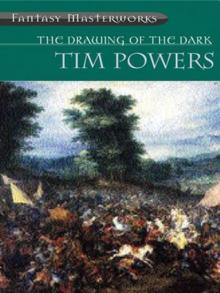 Drawing of the Dark
Drawing of the Dark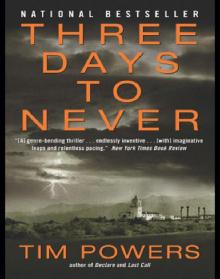 Three Days to Never
Three Days to Never